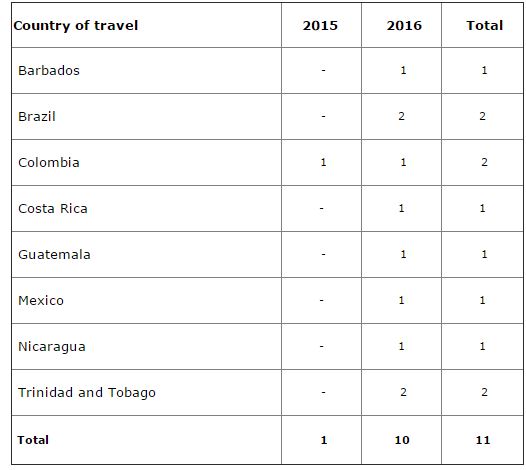ELEVEN cases of the Zika virus have been diagnosed in southern Ireland since 2015, while less than five cases were found north of the border in the same period.
According to Ireland's Health Service Executive (HSE) website, eleven cases have been diagnosed in southern Ireland in the last year.
"Zika virus does not naturally occur in Ireland," the HSE claims, before adding "however, as of 9th September 2016, there have been a total of 11 cases who have travelled to an affected area and been diagnosed in Ireland."
Those affected were diagnosed after returning from Zika-affected areas, as shown in the following table, supplied by the HSE:
 The affected areas where people from southern Ireland caught the Zika virus (Source HSE)
The affected areas where people from southern Ireland caught the Zika virus (Source HSE)The Public Health Agency in Northern Ireland have also confirmed that up to five cases have been diagnosed in the North since 2015 - although their policy is not to release an exact figure of diagnoses if it is below five, so as not to identify those affected.
A spokesperson explained: "Zika does not occur naturally in the UK, however, since 2015, the Public Health Agency (PHA) can confirm that there have been less than five cases of Northern Ireland residents diagnosed with Zika virus."
"All have a history of travel to Zika-affected areas," they added.
According to the Health Service Executive, Zika is a viral infection that usually causes a mild illness that typically lasts between two and seven days.
The HSE also says 80 per cent of people who become infected by the Zika virus have no symptoms.
The Zika virus is spread through the bite of a particular mosquito that is found in certain countries, for those who have symptoms, the most common include:
- mild fever
- muscle or joint pains
- headache
- itchy rash
- conjunctivitis (sore eye)
According to the HSE website, infection with the Zika virus has been strongly linked with a serious birth condition called microcephaly, which causes babies to be born with an unusually small head.
In these cases, the baby’s brain may not have formed properly during pregnancy.

